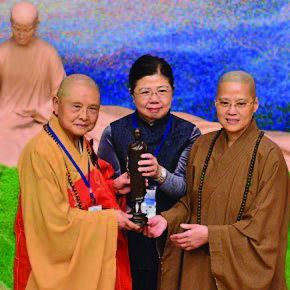

A ceremony in Taiwan to honor outstanding women in Buddhism (https://www.tzuchi.org.tw/en/index.php).
With the earliest religious reform efforts being launched by refugee monks from China about 60 years ago, the resulting movements within Pure Land Buddhism in Taiwan are succeeding in combining traditional Buddhist values with a desire for worldly engagement in altruistic as well as capitalist activities, writes Sumanto Al Qurtuby in the current issue of the Journal of Contemporary Religion (October 2020). The author focuses on such movements as Fo Guang Shan (Buddha’s Light Mountain), Tzu Chi Gongdehui (Compassionate Relief Merit Society), and Fagu Shan (Dharma Drum. Mountain), which have not given up basic doctrines and traditional religious norms but endowed them with new meanings that take into account contemporary developments.
These movements’ impact goes beyond Taiwan, with Fo Guang Shan having branches in some 50 countries and Tzu Chi having a presence in 14 countries. Animated by a spirit of entrepreneurship and an ethos of philanthropy, the movements have been developing both businesses and humanitarian services, and are behind a variety of initiatives ranging from educational institutions to medical care and international relief. The roots of the views promoted by these movements can be traced to the legacy of Chinese Buddhist reformers going back as far as the nineteenth century. But Qurtuby stresses that the “unique kind of spirit of capitalism in Taiwan” has encouraged Taiwanese Buddhists to be involved in such activities. “Those innovative ideas in reforming Buddhism can be understood as outcomes of the dialectics between modernization and tradition.”
(Journal of Contemporary Religion, https://www.tandfonline.com/toc/cjcr20/current)